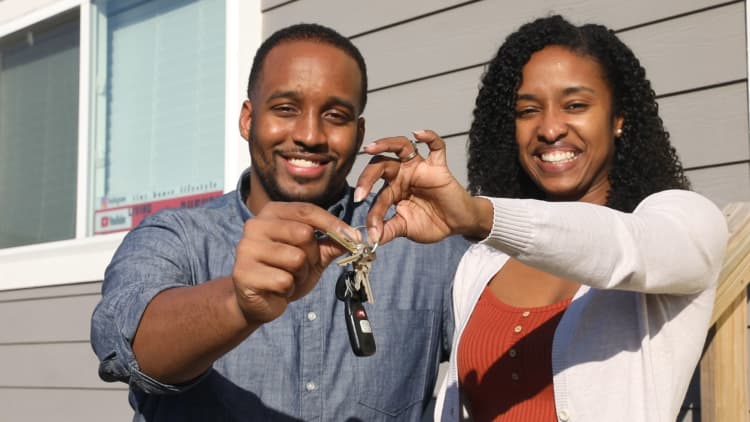Closing his hair salon, Aesthetic Hair Co., in Detroit, Michigan, is the hardest thing 26-year-old Alex Pardoe has ever had to do.
Due to the coronavirus pandemic, Pardoe and his co-owners had to shutter the salon on March 17, and temporarily let go of all of their employees so they could collect unemployment benefits.
"Having to lay off my employees was one of the most difficult decisions that me and my business partners have ever had to make," he tells CNBC Make It. "But in this particular climate, we had really no other option. There is no way for us to keep people on a payroll with nothing coming in."
Still, Pardoe knows closing was the right choice. Although it's a stressful time for everyone, "it's an important time for us to stay home and be as healthy as we possibly can," Pardoe says. "With hairdressing, there is no way for us to maintain social distance. It was really important for us to close."
The salon received a loan through the Paycheck Protection Program during the second round of funding, which the co-owners plan to use to cover payroll costs once they are allowed to reopen. Currently, they are using the loan to cover other qualified costs, like rent and utilities, per guidelines set by the Small Business Administration. They plan to carefully follow the SBA's guidelines for the loan in order to have it eventually forgiven.
For Pardoe himself, closing the doors at Aesthetic has meant a significant loss in income. He previously earned around $280,000 a year, primarily from working with clients directly cutting hair, putting in extensions and doing color work. But as the pandemic continues, he's self-isolating at home with his dog, Biscuit, unable to see clients in person.
With hairdressing, there is no way for us to maintain social distance. It was really important for us to close.Alex Pardoe
Pardoe still brings in some income from partial ownership in an investment property, his e-commerce line of hair products, online education and affiliate and sponsored opportunities through Instagram. He estimates that generates about $3,000 to $4,000 per month, which covers a large chunk of his expenses, and he also says he will receive about $350 per week in unemployment.
And although he can't see customers in person, he's doing everything he can to help from afar. "A lot of my clients have been reaching out to me like, What should I be doing during this time? How is this going to grow out? I FaceTime with a lot of my clients and help them take out their own extensions."
How Pardoe's budget has changed during the pandemic
A year ago, Pardoe's budget looked much different. He was able to spend thousands on designer clothes and treating his friends to meals and drinks out.
"With the amount that I work, it's rewarding to come home and have the things that I want to have," he previously told Make It. "It's rewarding to be able to put on a pair of shoes that I worked really, really hard for."
Here's a breakdown of his estimated monthly spending as of April 2019:
- Cars: $4,180 (includes gas, insurance and payments for his Mercedes Benz G-550 and BMW i8)
- Food: $2,500
- Rent, utilities and Wi-Fi: $1,970
- Miscellaneous: $1,875 (includes travel, entertainment, dog expenses, donations and cabs)
- Savings: $1,800 (he puts $500 a month into his Roth IRA and $1,300 in a brokerage account)
- Clothes, shoes and accessories: $1,500
- Insurance: $730 (includes disability, life and renters insurance)
- Phone: $230 (covers the cost of both a work and personal phone)
- Credit card repayment: $100
- Subscriptions: $50 (includes Hulu, Netflix, HBO Go and Amazon Prime video)
Under lockdown, many of Pardoe's expenses have automatically disappeared, including any spending on clothes, drinks or meals out. "I'm not really spending any money on entertainment just because I'm not going out," he says. "I'm not picking up the tab for drinks at dinner. The most amount of money that I'm spending at home is through my subscription services and maybe once a week I'll get food delivery."
While he usually pays off his credit card bill in full each month, he's currently only paying the minimum. He admits it's not an ideal solution, but his card issuer is waiving interest for the time being, so he's not racking up additional debt.
Here's his expenses in April 2020:
- Cars: $3,850 (includes insurance and payments for his Mercedes Benz G-550 and BMW i8)
- Savings: $1,800 (he still puts $500 a month into his Roth IRA and $1,300 in a brokerage account)
- Housing: $1,600 (includes his mortgage and homeowners insurance)
- Food: $1,200
- Insurance: $1,050 (includes health, life and disability)
- Utilities: $300 (includes gas, electric, water and Wi-Fi)
- Dog expenses: $300
- Phone: $200 (he only has one phone now)
- Credit card minimum payment: $25
- Streaming services: $24 (includes Hulu, Netflix and Disney+)
The pandemic isn't the only thing that changed Pardoe's budget, however. Over the past year, he's worked on learning more about money and taking control of his finances. "When I did my interview last year, I had no financial advisor because I didn't know any better, and I was young," he says. "You're not taught finances. I learned a lot about just how to manage things a little bit better, and I'm still learning now."
Pardoe cut back on meals out, opting instead to start buying groceries and cooking more at home (though he jokes it's mostly frozen pizza). Instead of the $2,500 a month he previously spent on takeout via Uber Eats, Pardoe now spends around $300 a week on food, which comes to $1,200 a month.
His largest expense is his cars: a Mercedes Benz G-550 for $2,300 a month and a BMW i8 for $1,300 a month. Before the pandemic hit, Pardoe planned to sell the BMW, but he had to put the sale on hold. After things start to return to normal, he still plans to unload the car.
"It's unnecessary for me to have two cars," he says. "I think getting that BMW is a bad decision, so I'm excited to hop off that train."
Pardoe also opened a high-yield savings account and moved the majority of the $77,000 he had in cash out of his checking account and into savings.
A significant portion of his savings went into buying his first home, a $289,000 four-bedroom three-bathroom house in metro Detroit. He put $35,000 down on the home and spent another $12,000 on renovations.
Pardoe's plan for the future
While some of his expenses are less simply because he's staying home, Pardoe hasn't consciously made any changes to his budget in direct response to the pandemic.
If the lockdown in Detroit persists past May 15, and he's unable to reopen the salon, he plans to halt contributions to his savings and defer his car payments. "I will most likely cut back on adding any money into my life insurance, my Roth IRA and my brokerage account," he says. It doesn't make sense to Pardoe to keep putting money away for the future if he's not able to cover all of his expenses right now.
Pardoe will also consider dipping into the $20,000 he keeps in his checking account or the $35,000 he has in a high-yield savings account, but considers this option a last resort. If things get really dire, he'd even be willing to sell some of his Hermes Birkin bags, which cost him around $7,000 a piece, since he sees them as investment pieces.
"I would have no problem selling them to pay for three months of expenses," he says. "It's going to be a huge return on investment regardless."
Pardoe is doing everything he can to keep himself and his employees safe during this time. But he's hopeful they'll be able to reopen the salon in the near future and welcome back his employees and customers.
"What's helping us maintain some kind of normalcy throughout all of this financial craziness is knowing that I'm not going to have to let anyone go permanently," he says. "As long as we're closed, they're out of work. But the second we're back open, they're all back."
How he can make the most of his money during this time
CNBC Make It spoke to Georgia Lee Hussey, certified financial planner and founder and CEO of Modernist Financial, a B Corp wealth management firm, about Pardoe's current budget and plan to weather the pandemic. Here are her insights on how he can set himself up for financial success.
He should reevaluate his life insurance policy
Pardoe puts $700 per month into a joint life and disability insurance plan. While it's smart for him to be properly insured, especially because he owns his own business and works on his feet all day, it's likely he's paying for more coverage than he needs, Hussey says.
"Young people without children are sold permanent life insurance policies that they do not need and are extremely expensive," she says. For people in Pardoe's position, "it's very rare that this type of policy is a good fit."
As Pardoe considers pausing contributions to this policy, it's also a good time to reevaluate it altogether to ensure that he's getting the best value for his money. He should look into converting it to a term life insurance policy, which is typically much cheaper, Hussey says.
He should make his savings last as long as possible
If the shutdown continues past May 15, Pardoe plans to start consciously cutting expenses wherever he can. That's a smart move, says Hussey. As Pardoe looks for places where he can trim his budget, he should also evaluate if his spending habits align with his values, she adds.
He should ask himself: What is enough? In Pardoe's case, that might mean downgrading his car to something cheaper. Or it might mean sacrificing in other areas to keep the car if it's worth it to him. He should think about what's most important to him and apply that to his spending, both now and going forward.
In addition to limiting his expenses as much as possible, Hussey suggests that Pardoe should think about how he can bolster his current streams of income.
I would pretend that the savings doesn't exist.Georgia Lee Husseycertified financial planner
He should aim to make his savings stretch for as long as possible. "I would pretend that the savings doesn't exist," Hussey says. "Pull down your expenses, don't pull from savings."
He should consider hiring a fee-only certified financial planner
Although Pardoe should concentrate on cutting expenses as much as possible right now, reviewing his money with a fee-only certified financial planner would be a worthwhile investment, Hussey says.
"Somebody who doesn't sell products," she reiterates. "Their only job is to give him advice at an hourly rate. That would be the best investment in himself right now."
A qualified CFP can help Pardoe parse tricky jargon as he reevaluates his life insurance policy, as well as work with him to cut expenses and develop a budget that aligns with his values. He can also look for someone who specializes in business planning to help him make thoughtful choices both personally and professionally.
"Use this opportunity to engage with a fee-only financial planner who can help you put together a long-term plan that is really going to benefit you and also be efficient in terms of cost and tax structure," Hussey says.
Although the future is uncertain, Pardoe's best course of action right now is simple: "Try to hunker down, try not to spend out of your savings, reduce your expenses where you can," Hussey says.
Check out: The best credit cards of 2020 could earn you over $1,000 in 5 years




